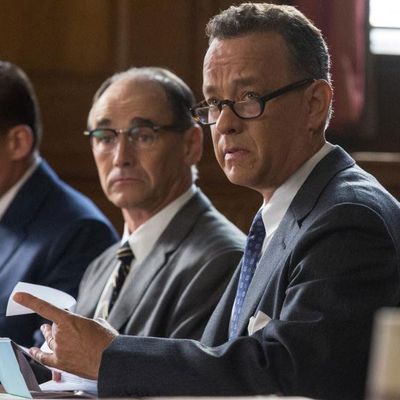
With his sober but stirring Cold War suspense film Bridge of Spies, Steven Spielberg continues his creative evolution from fatherless child to nervous father wondering (absent role models) if he’s doing the right thing in the right way. His protagonist is James Donovan (Tom Hanks), a Brooklyn insurance lawyer tasked with defending a British-born Soviet citizen named Rudolf Abel (Mark Rylance) against the charge of spying for the Soviets. We see in the first (masterly) sequence that Abel is indeed a spy (no mystery), but Donovan wants the court to regard the man not as a traitor to be executed but a foreign soldier doing his duty — and bravely refusing to give up information. In this most nebulous of conflicts in a world that could nonetheless end in a nuclear instant, a figure like Abel would look mighty good strapped in the electric chair. But Donovan — though pilloried — stands tall.
The movie — written by Matt Charman and Ethan and Joel Coen, based on a true story — is explicitly a dramatization of personal integrity amid social madness. And Spielberg can be pretty explicit. But as Lincoln showed, he has a grown-up passion for the subtle arts of negotiation and persuasion. Donovan embodies the idea that no matter how corrupt the system, a principled, talented individual can set right the most battered and bloody ship of state. Even the government that dislikes and publicly dissociates itself from him sends him on a secret mission: trading Abel for a downed U-2 pilot (Austin Stowell), who disappointed his leaders by not committing suicide before capture. The “bridge of spies” is where the exchange will take place, in a newly walled-off East Berlin.
Is it worth saying again that I miss Hanks the impudent comedian and wish he weren’t so often the standard-bearer for American decency? Okay, I’ve said it. He’s still impressive — he makes you feel Donovan’s struggle to keep a clear head while stumbling (with a lousy cold) among shadowy antagonists in a frigid East Berlin, a maze of doublespeak interrupted by machine-gun fire at poor souls scaling the wall.
Spielberg evokes that free-floating malevolence superbly, though he founders when shoehorning in the plight of an American student arrested as a spy. In the large cast, Amy Ryan has disgracefully little to do as Donovan’s wife, but various dour agents are convincing and Mikhail Gorevoy has a deliciously evocative Peter Lorre timbre as a KGB mastermind. It’s Rylance who keeps Bridge of Spies standing. He gives a teeny, witty, fabulously non-emotive performance, every line musical and slightly ironic — the irony being his forthright refusal to deceive in a world founded on lies. The poetic embodiment of fatalism, he is Donovan’s closest ally in terms of integrity but his opposite when it comes to slogging away on behalf of lost causes.
*This article appears in the October 5, 2015 issue of New York Magazine.


